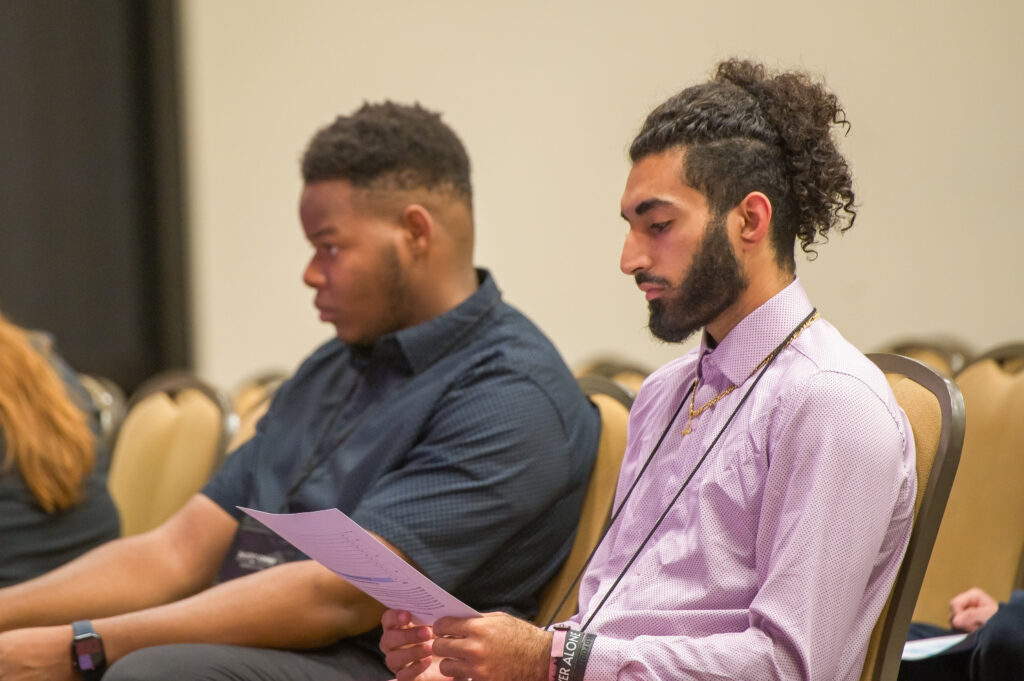The Power of Asking for Help: How Guidance and Courage Transformed My Academic Future
Written by Arsany Mason

Arsany Mason at the Cooke Foundation’s annual Scholars Weekend conference in 2024
Born in Egypt and relocating to the United States at age four, my childhood was shaped by profound challenges. By five, I was in foster care, and though I was adopted at 10, I re-entered the foster system at 17. By the start of my senior year of high school, my GPA was just 1.8. College seemed out of reach and in truth, it was barely on my radar.
That changed when my foster guardian, Mr. Green, impressed upon me the transformative power of education. He helped me envision a future beyond high school, and I began a laser-focused—and frankly, nerve-wracking—effort to rebuild what was my academic record and apply to colleges. While I received an offer to play Division III football at one school, Mr. Green encouraged me to consider starting at a junior college to better position and prepare myself for long-term success.
The path to those goals—transferring from a junior college to a prestigious four-year institution—was daunting. Still, with the help of the Transfer Scholars Network and the Jack Kent Cooke Foundation, I navigated the complex transfer process and enrolled at Amherst College. As I’ve learned, it’s never too late to chase your dreams. You just need the courage to ask for help.
As I’ve learned, it’s never too late to chase your dreams. You just need the courage to ask for help.
For students like me, the odds can often seem stacked against us. Although 80 percent of community college students aspire to earn a bachelor’s degree, only one-third successfully transfer to a four-year institution. Even more striking, community college transfers make up just five percent of the undergraduate population at elite colleges and universities.

The transfer process itself is filled with barriers that make the journey even harder. For example, students lose an average of 43 percent of their credits during transfer, negating semesters of hard work and increasing the time – and cost – it takes to graduate. These obstacles don’t reflect a lack of ability. They are systemic issues that can make an already challenging path feel insurmountable.
But here’s the thing: it is possible.
Research shows that community college students who do transfer are just as capable of thriving at their new institutions as those who start at four-year institutions as freshmen. The problem isn’t our potential—it’s the limited awareness, support, and opportunities available to help us fulfill it.
Thankfully, there are a growing number of organizations and individuals who believe in us. Programs like the Transfer Scholars Network and the Cooke Foundation’s Undergraduate Transfer Scholarship recognize that community colleges are filled with talented, driven students who just need the right support to succeed. Likewise, teachers, counselors, and mentors at many schools are eager to help students realize their promise–even if you only discover that promise in the final moments of high school, as I did.
I was especially fortunate to have Mr. Green, my foster guardian, to guide me through tough decisions and show me that starting at a junior college wasn’t about settling – it was a strategic first step toward my future. From there, the Transfer Scholars Network and the Cooke Foundation provided the guidance and financial resources I needed to navigate the transfer process and beyond. Even now, as I navigate life at Amherst College, I continue to benefit from the Cooke Foundation’s unwavering support—through its generous scholarship and the invaluable network of fellow Scholars.
There’s no shame in asking for help. It’s never too late to change your story. With the right guidance, determination, and a willingness to reach out, you can achieve more than you ever thought possible.